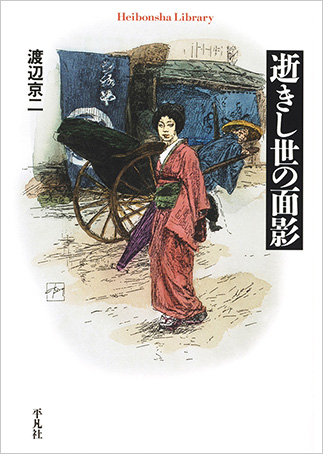
CULTURE AND HISTORY
Yukishi yo no omokage
[trans. Remnants of Days Past]
Heibonsha (Heibonsha Library), 2005. 606 pp. ¥1,900. ISBN 978-4-582-76552-6.
Also published in: Chinese (simplified characters) and English
In the latter half of the nineteenth century, following Japan’s opening to the outside world, many Western visitors wrote accounts of their travels and experiences, but today these accounts are little acknowledged. However, the author, Watanabe Kyōji, made a great discovery by tackling this mountain of prose. In the eyes of foreign visitors, he explains, Japan appeared as a country that had achieved a marvelous civilization. As he emphasizes, many of them, though at times bewildered by the great disparity between Japan’s civilization and that of the West, wrote of it in glowing terms. However, he concludes, this civilization died out in the process of Japan’s modernization in the late nineteenth and early twentieth centuries.
These early accounts by foreign visitors have been often regarded negatively by Japanese intellectuals. They thought that the writings were unrealistic in the manner criticized in Edward Said’s Orientalism or that they romanticized a premodern past that deserved to be rejected. Nonetheless, having carefully read through many accounts, Watanabe insists that their appraisals were not without foundation, illustrating his argument with many examples of the charms of Japan’s Lost World.
A picture emerges of “good old days” when even poor people led cheerful and emotionally satisfying lives, women showed surprisingly liberated attitudes toward sexuality, and children were treasured and well looked after. While naturally there might be some idealization here, there is a greater sense of surprise at a first encounter with a different culture. This valuable work offers a new perspective for considering modernization in Japan. (NM)
These early accounts by foreign visitors have been often regarded negatively by Japanese intellectuals. They thought that the writings were unrealistic in the manner criticized in Edward Said’s Orientalism or that they romanticized a premodern past that deserved to be rejected. Nonetheless, having carefully read through many accounts, Watanabe insists that their appraisals were not without foundation, illustrating his argument with many examples of the charms of Japan’s Lost World.
A picture emerges of “good old days” when even poor people led cheerful and emotionally satisfying lives, women showed surprisingly liberated attitudes toward sexuality, and children were treasured and well looked after. While naturally there might be some idealization here, there is a greater sense of surprise at a first encounter with a different culture. This valuable work offers a new perspective for considering modernization in Japan. (NM)

Translation rights inquiries
Heibonsha Ltd.
3-29 Kanda Jimbō-chō, Chiyoda-ku,
Tokyo 101-0051
Email: h-kaigai@heibonsha.co.jp
(When sending an e-mail, please enter a half-width character "@" instead of a full-width character "@.")

